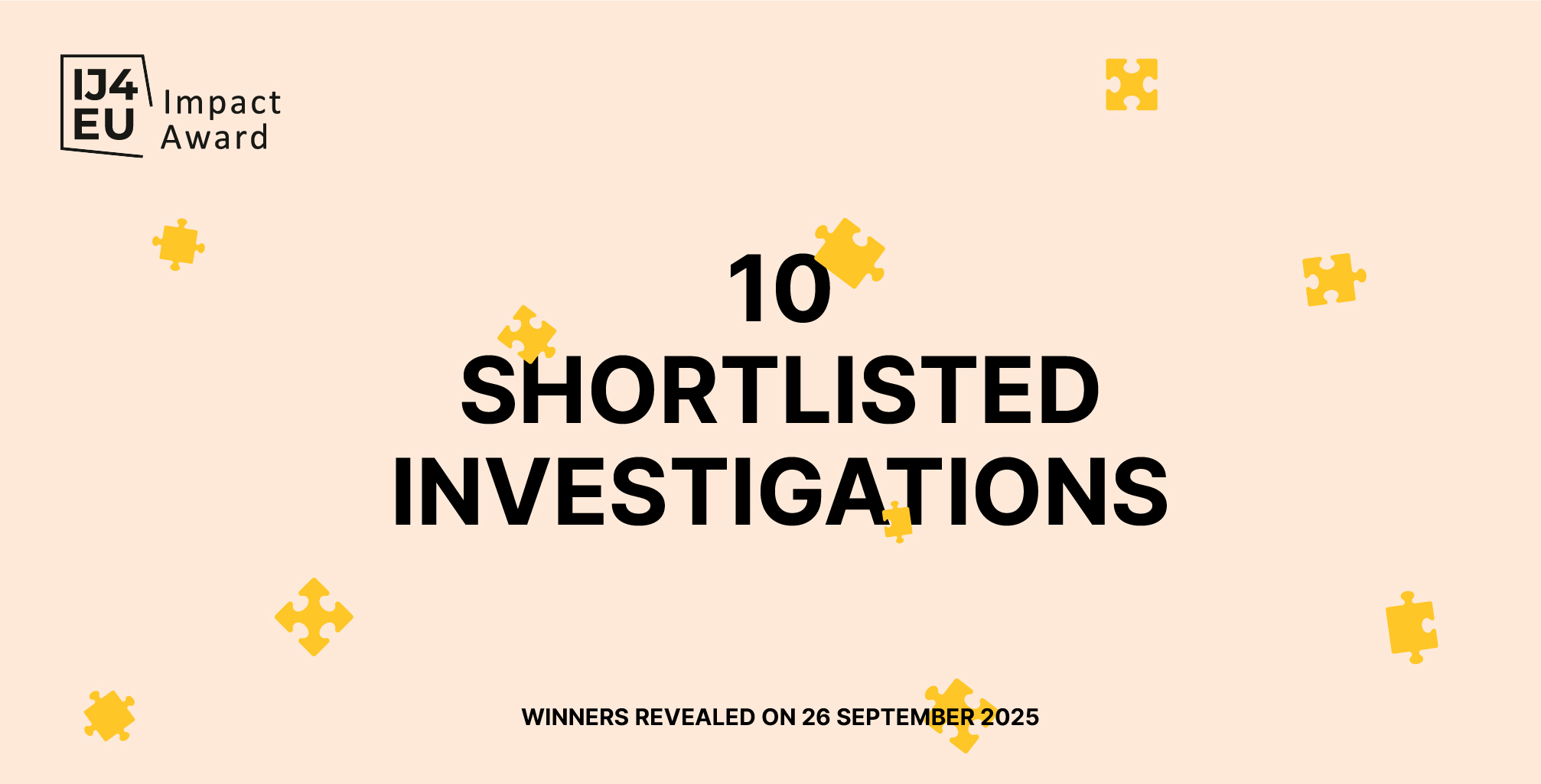Winners of the fifth annual IJ4EU awards for cross-border investigative journalism will be announced on September 26.
Ten outstanding investigations have been shortlisted for the 2025 IJ4EU Impact Award, Europe’s annual prize celebrating impactful collaborative journalism.
This year’s pool of eligible nominations reflects the power of cross-border collaboration in European watchdog reporting, with projects submitted by 36 teams spanning 58 countries — including all 27 EU member states and nations well beyond European borders.
Independent evaluators at Leipzig University conducted a rigorous analysis of nominations to select the shortlist. The selection process was convened by the European Centre for Press and Media Freedom, one of the IJ4EU fund’s core partners and the organiser of the Impact Award.
An independent jury chaired by Gillian Phillips will select three winning teams, each receiving €5,000. While the shortlist highlights exceptional entries, the jury has the flexibility to choose winners from the entire pool of eligible nominations.
The winners will be announced on September 26 at the closing ceremony of UNCOVERED, IJ4EU’s annual conference. This year’s conference will be hosted in Athens by the iMEdD International Journalism Forum.
Here are the 10 shortlisted investigations, listed in alphabetical order.
The Baku Connection
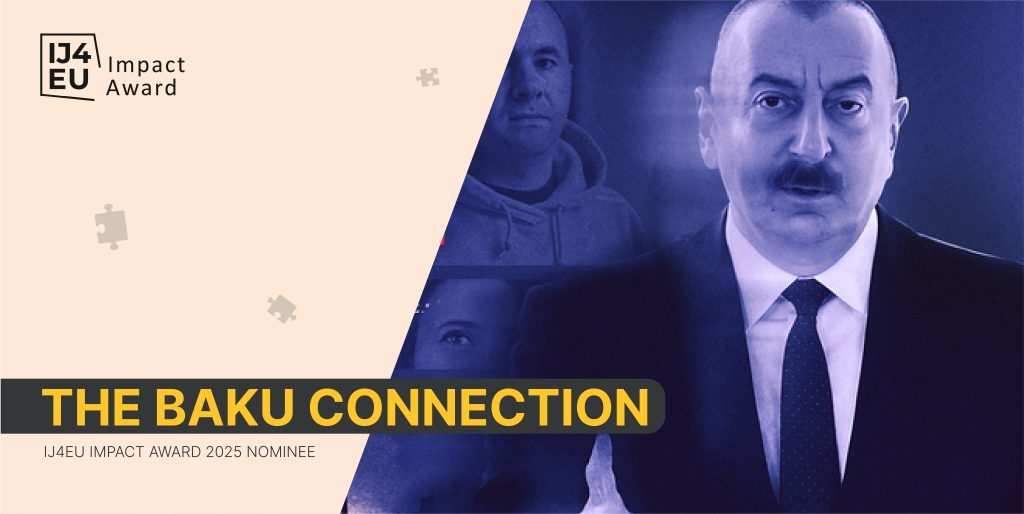
By a consortium of international media partners led by Forbidden Stories
“We call on all investigative journalists around the world to support us and continue our investigations where we left off.”
Fifteen outlets, coordinated by Forbidden Stories, responded to that call — taking up the work of Azerbaijani journalists Ulvi Hasanli and Sevinc Vaqifqizi of Abzas Media, who were imprisoned alongside four of their colleagues by Azerbaijani authorities.
The investigation they continued exposed far more than local corruption: from the murky management of Azerbaijan’s prison system and environmental abuses at the Gedabek gold mine, to EU funds flowing into Azerbaijan’s prison system known for human rights violations.
It also reveals how election monitoring was manipulated, and uncovers a financial network involving millions in embezzled funds moving through Luxembourg, France and Azerbaijan just as Azerbaijan prepared to host COP29.
Deadly prices – How big pharma feeds inequality in Europe
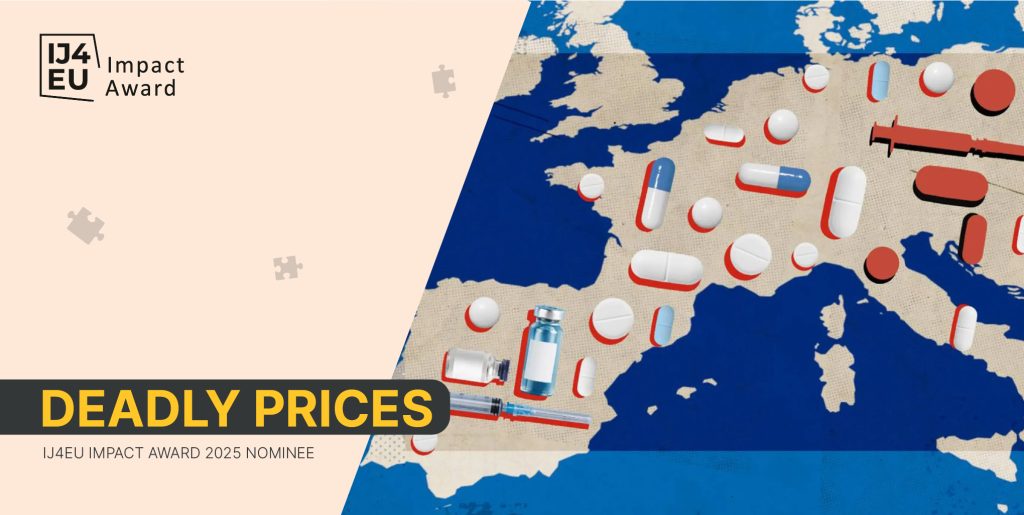
By Investigate Europe and its partners NDR, WDR, Süddeutsche Zeitung, Reporters United and Eesti Ekspress
Why are life-saving medicines still out of reach for so many in Europe — and who profits from the pain?
This consortium of media outlets led by Investigate Europe exposes how pharmaceutical giants exploit opaque pricing systems, lobbying power and intellectual property rules to keep drug costs high across the continent.
With powerful reporting from across EU member states, the cross-border team uncovers how governments are often out-negotiated, patients left waiting, and public health budgets strained, all while Big Pharma’s profits soar.
This is investigative journalism that demands answers from a system built to benefit shareholders over lives.
The Gaza Project
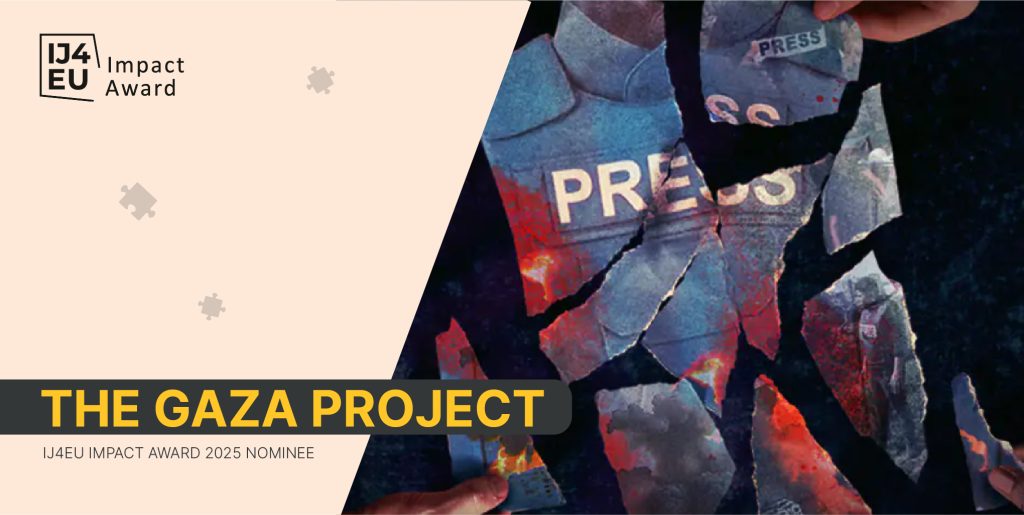
By a consortium of international media partners led by Forbidden Stories
Press vests have become targets.
Since Hamas-led attacks on Israel on October 7, 2023, Palestine has become the most dangerous place on earth for media workers, with scores of journalists killed in Gaza and the West Bank.
In response to this deadliest conflict for the press in recent history, The Gaza Project brings together 50 reporters from 13 newsrooms, coordinated by Forbidden Stories, to investigate nearly 100 cases of journalists killed, injured or allegedly targeted.
Unable to report from inside the Gaza strip, the team gathered more than 120 witness accounts, mapped GPS data, traced ballistic trajectories, and consulted 25 independent experts. The result: compelling evidence that challenges Israeli government denials and exposes a chilling pattern of attacks on the press.
How an EU-funded security force helped Senegal crush democracy protests
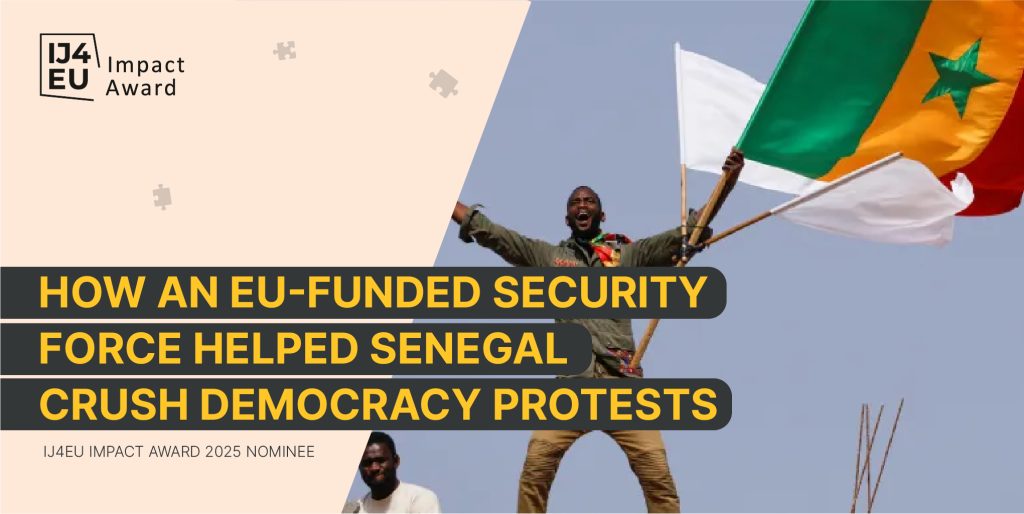
By Andrei Popoviciu and José Bautista, Al Jazeera English and Fondación porCausa
Built to tackle border crime in West Africa, used to crush democratic dissent in Senegal
This investigation reveals how an elite security force known as GAR-SI, backed by millions in EU funding, was deployed to suppress protests sparked by the prosecution of opposition leader Ousmane Sonko. Dozens were killed, and many more injured or arrested, as Senegalese authorities used EU-supplied armored vehicles and gear to target demonstrators, often far from any border.
Internal documents, footage and a confidential evaluation expose not only the force’s domestic use, but also a pattern of corruption, poor oversight and rights abuses.
The investigation led members of the European Parliament to call for a formal inquiry into how EU-funded security projects are being used to undermine the same democratic values they’re meant to uphold.
Kremlin Leaks: How the Russian Red Cross became part of Vladimir Putin’s war and propaganda system
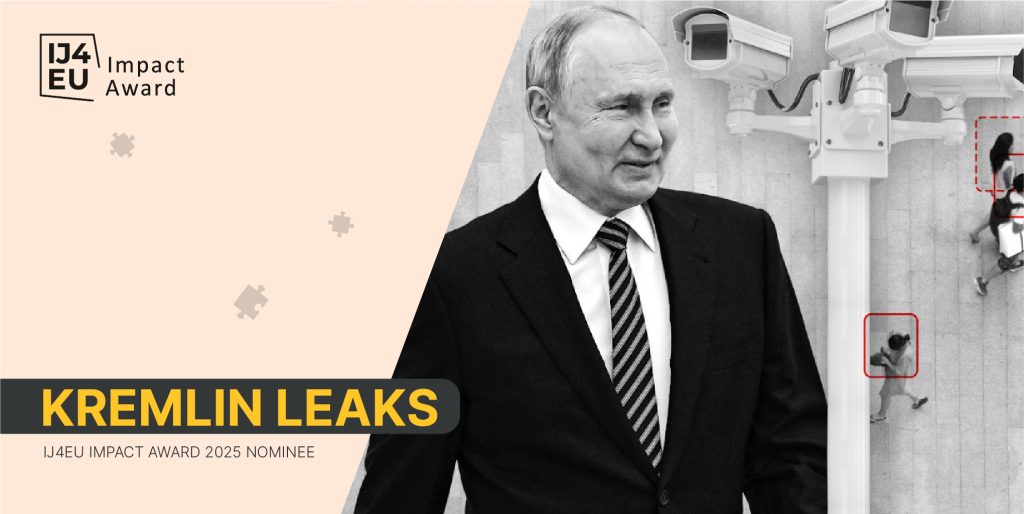
By Delfi Estonia, Expressen, Frontstory.pl, Meduza, iStories, Paper Trail Media, Der Spiegel, Der Standard, Tamedia, VSquare and ZDF
Exposing the propaganda machine’s panopticon view
Seventeen journalists from seven countries joined forces to verify and analyse a cache of documents leaked from Putin’s presidential administration.
Published in the run-up to Russia’s presidential election, Kremlin Leaks offers a unique insight into how the Kremlin stages a billion-dollar performance of civic engagement, creating fake networks of opinion leaders and running a propaganda system that tracks Russians from birth to death, while spying on every step they take on the internet using sophisticated IT systems.
The investigation also uncovers how Russia’s propaganda machine extends to unexpected institutions, including even the Russian Red Cross. Documents show its involvement in the “re-education” of children deported from occupied Ukraine and routine engagement in Russia’s patriotic military camps, where young children are taught to handle rifles and train in close-combat.
Passportgate
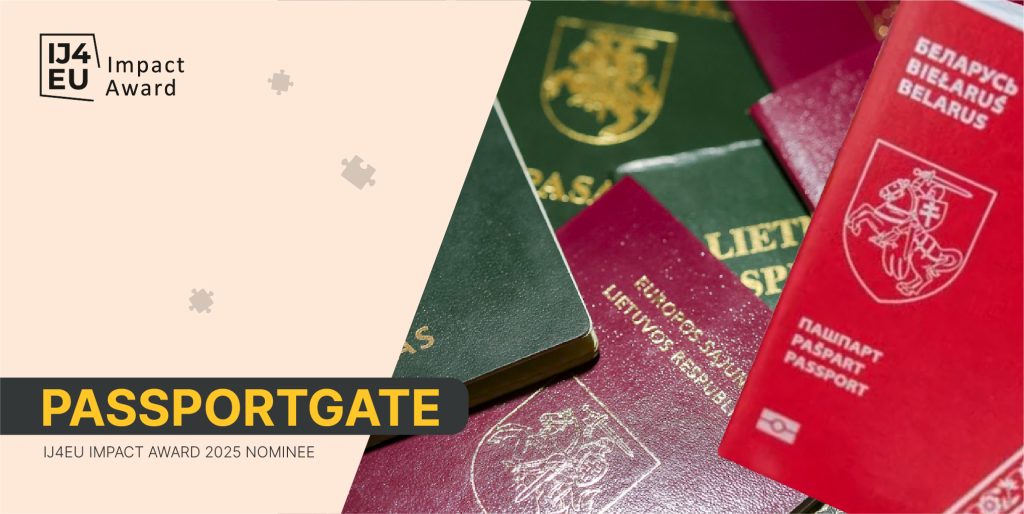
By the Belarusian Investigative Center (Alina Yanchur, Stanislau Ivashkevich, Maksym Savchuk) and 15min.lt (Jūratė Damulytė, Gabriele Navickaite, Jurgita Šimelevičienė)
New passports, same oligarch
This series of investigations shows how one man’s monopoly has quietly shaped the business of state control.
That man is Viktor Chevtsov, a powerful oligarch known as “Lukashenko’s moneybag”. He profits from a company called Golograficheskaya Industria, which has held a state-granted monopoly on producing security holograms and crystallograms that are state-mandated on a wide range of consumer products, securing a steady flow of public money into private hands.
But the story doesn’t end there. Reporters also uncovered ties between Chevtsov and Lithuania’s longtime passport producer, Garsų pasaulis, the very company chosen by Belarusian opposition leaders to create the “New Belarus” passport — a document meant to give safe, legitimate identification to Belarusians in exile. Unbeknownst to the Belarusian opposition, Garsų pasaulis and Chevtsov co-own a company registered in Lithuania.
Poison PR
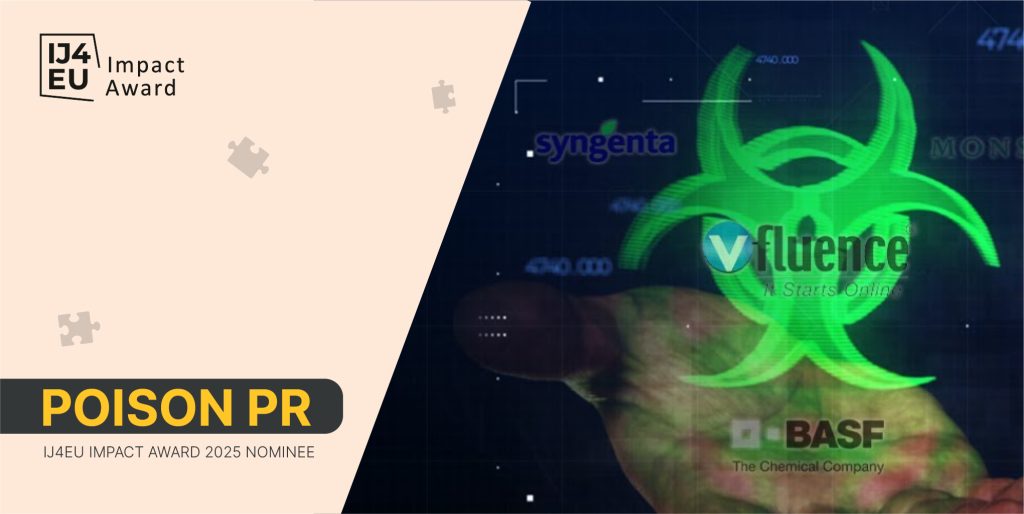
By Lighthouse Reports, Le Monde, The Guardian, Africa Uncensored, The New Lede, The New Humanitarian, ABC News Australia, The Wire, Premium Times and The Continent
US taxpayer money channelled to a secret campaign to promote pesticides
A consortium of outlets coordinated by Lighthouse Reports shows how the US government funded a covert campaign by the public relations company v-Fluence to downplay the risks of pesticides, discredit opponents and undermine Europe’s Green Deal.
Among other things, taxpayer money was channeled to an exclusive social network named “Bonus Eventus”, exposing the private data of hundreds of pesticide critics including scientists, politicians, campaigners and UN experts to its members, including US government officials.
The investigation also reveals that v-Fluence used influence and misinformation campaigns to undermine the EU Green Deal and a conference on the health risks of hazardous pesticides in Kenya, leading international funders to withdraw their support from the event.
“Say Privet”
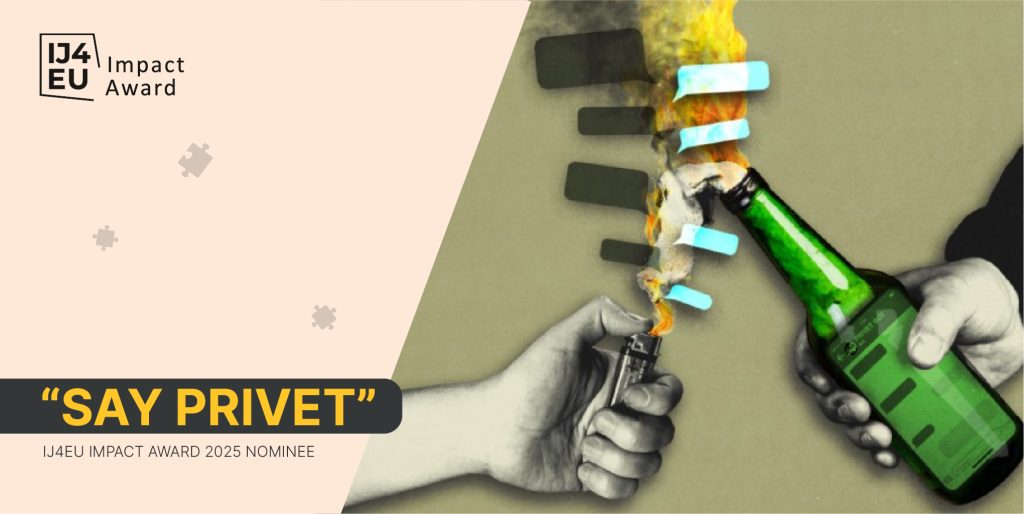
By Delfi Estonia, OCCRP, Paper Trail Media, Der Standard, Re:Baltica and ZDF
“Just say hi to us.”
That is exactly what journalists from from this consortium of outlets did to gain access to a covert Telegram channel linked to the Wagner mercenary group for their undercover investigation.
Behind this simple greeting lies a disturbing recruitment pipeline: Young men with pro-Russian views are being targeted and encouraged to “join the fight against Ukraine’s Western allies”.
These channels, which Western experts believe are backed by Russian intelligence services, offer payment in cryptocurrency in exchange for acts of sabotage, espionage, arson and even murder. The goal is clear: spread fear and chaos, and weaken support for Ukraine from within Western societies.
Shady Green Finance
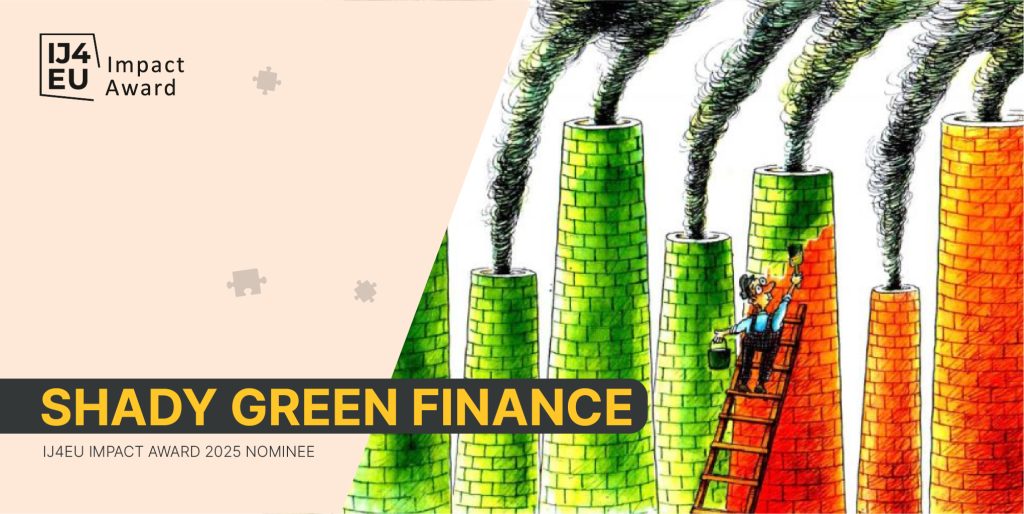
By Stefano Valentino and Giorgio Michalopoulos, freelance journalists / Voxeurop
Was green finance meant to fix the environmental crisis or to hide it?
What was once introduced as a tool to steer money away from climate-damaging industries is now being hijacked to legitimise them.
A year-long investigation reveals how companies involved in oil and gas, coal mining, aviation, fashion and even arms manufacturing are cashing in on green investment schemes, by exploiting regulatory loopholes, using vague language, and leaning on weak voluntary standards to issue so-called green bonds often with no binding climate conditions.
These funds allow the companies to finance their business as usual behind their public climate commitments, and spread misleading messages about the supposed sustainability of their brands.
Desert Dumps
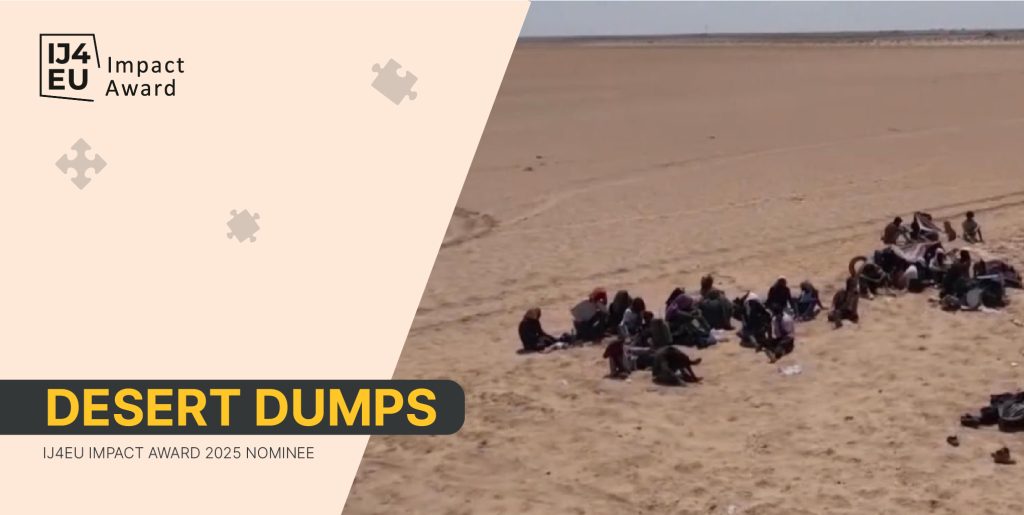
By Lighthouse Reports, Enass, Inkyfada, Der Spiegel, Le Monde, El Pais, IrpiMedia and Tagesschau
Europe complicit in ‘desert dumps’
Across North Africa, tens of thousands are forcibly removed and abandoned in barren desert zones, left at risk of starvation, violence and death. These expulsions are carried out with European funds, masked by the sanitised language of “migration management” — and often, with Europe’s knowledge.
The investigation reveals that EU-sourced resources, including money, vehicles and surveillance technology, directly enable these “desert dumps”, which systematically target Black communities through racial profiling and forceful expulsion in Morocco, Mauritania and Tunisia, even after people’s legal status and livelihoods in these countries have long been established.
